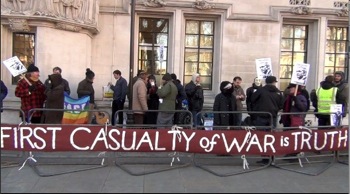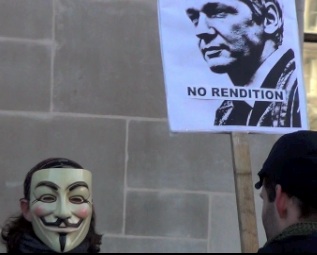Since its 2004 debut, use of the European Arrest Warrant (EAW) has exploded; in those eight years, its flaws have already destroyed or destabilized many lives. Although high-ranking EU officials now admit that the current EAW system is a "threat to human rights," EAW reform may not happen soon enough to prevent it from snaring more victims ... including Julian Assange.
 "Edmond Arapi was tried and convicted in his absence of killing Marcello Miguel Espana Castillo in Genoa, Italy in October 2004. He was given a sentence of 19 years, later reduced to 16 years on appeal. Edmond had no idea that he was wanted for a crime or that the trial even took place. In fact, Edmond hadn't left the UK at all between the years of 2000 to 2006. On 26 October 2004, the day that Marcello Miguel Espana Castillo was murdered in Genoa, Edmond was at work at Café Davide in Trentham, and attending classes to gain a chef's qualification. Edmond was arrested in June 2009 at Gatwick Airport on a European Arrest Warrant (EAW) from Italy, while he was on his way back from a family holiday in Albania. It was the first he knew of the charges against him in Italy ... A British court ordered his extradition on 9 April 2010."
"Edmond Arapi was tried and convicted in his absence of killing Marcello Miguel Espana Castillo in Genoa, Italy in October 2004. He was given a sentence of 19 years, later reduced to 16 years on appeal. Edmond had no idea that he was wanted for a crime or that the trial even took place. In fact, Edmond hadn't left the UK at all between the years of 2000 to 2006. On 26 October 2004, the day that Marcello Miguel Espana Castillo was murdered in Genoa, Edmond was at work at Café Davide in Trentham, and attending classes to gain a chef's qualification. Edmond was arrested in June 2009 at Gatwick Airport on a European Arrest Warrant (EAW) from Italy, while he was on his way back from a family holiday in Albania. It was the first he knew of the charges against him in Italy ... A British court ordered his extradition on 9 April 2010."
 During the second and final day of the U.K. Supreme Court's hearings on Julian Assange's extradition, Matrix Chambers attorney Clare Montgomery offered her rebuttal to arguments made yesterday by Assange's counsel. (Dinah Rose is representing Assange in his fight against extradition to Sweden for questioning on sex crime allegations.)
During the second and final day of the U.K. Supreme Court's hearings on Julian Assange's extradition, Matrix Chambers attorney Clare Montgomery offered her rebuttal to arguments made yesterday by Assange's counsel. (Dinah Rose is representing Assange in his fight against extradition to Sweden for questioning on sex crime allegations.)
The week's proceedings have highlighted disparities of law among EU countries and the legal challenges involved in reconciling these conflicts. Assange's case may test the extent to which EU nations can maintain their legal autonomy under the rubric of a unified European system. It may also raise the question: to what degree will EU states have to harmonize their conflicting legal regimes in order to avoid this sort of continued legal wrangling in the future?
Montgomery presented Sweden's case against Assange for about four hours, during which time she appeared to reject EU-wide legal standardization -- essentially arguing that respecting state sovereignty requires preserving the status quo. If it agreed with Montgomery's position, the Court would have to accept significant differences among EU nations in implementing EU-wide legal standards. By contrast, Assange's legal team largely took the position that, while allowing for some variation and inconsistency, the Court should mandate certain universal principles in the extradition process, because of the seriousness of the potential risk that extradition may pose to individual rights.
 At Day 1 of the Julian Assange extradition hearing
At Day 1 of the Julian Assange extradition hearing
On the night before the hearing began, one dedicated Assange supporter in London told me that she planned to arrive at Court by 6 a.m., ahead of the throngs that she expected based on the turnout at Assange's hearing last November. No doubt the freezing February temperatures kept large crowds at home this morning; instead of the masses anticipated, there were only a few orderly lines segregated into cameramen, sign-wielding protesters, and the courtroom audience -- a mix of media representatives, Assange faithfuls, and the curious. I was in the latter line, which was also peppered with a few Occupy London luminaries. During the next hour of collective shivering, I met journalists from all over Europe and the U.S., who now braved frigid weather to witness this historic proceeding. Arriving at around 8:30, one hour before the Court opened to the public, I witnessed the expectant crowd devolve into a chorus of complaints as the early-morning, late-winter wind chill robbed our fingers of almost all feeling.
But, mercifully, 9:30 at last arrived -- as did Assange, soon after. The white-haired WikiLeaks founder offered a spirited hello to the crowd and preceded us into the Court.
At the entry, Court staff had handed out a media briefing, which included the following details:
"Issue: Whether a European Arrest Warrant ('EAW') issued by a public prosecutor is a valid Part I EAW issued by a 'judicial authority' for the purpose and within the meaning of sections 2 and 66 of the Extradition Act 2003.
Theme by Danetsoft and Danang Probo Sayekti inspired by Maksimer